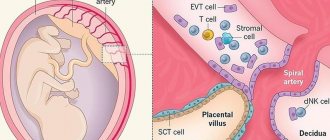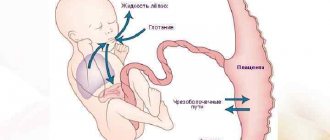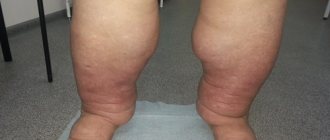The second trimester is considered to be the most wonderful period of pregnancy. It starts from the 14th week and comes to an end at the 27th. The expectant mother's body adapts to the new situation: nausea in the morning is already receding, hormonal levels stabilize, and, as a result, the mood becomes better.
As a rule, the belly in the second trimester noticeably increases, and the breasts look more voluminous. The baby is actively developing. It is no longer called an embryo, but a fetus. All systems of his body are adjusted to the upcoming work and even more intensive development.
Feelings of the expectant mother
The belly will become noticeably rounder, and already in the middle of the 2nd trimester of pregnancy, your position will become noticeable to everyone around you. Nausea, weakness and dizziness characteristic of the first trimester stop. We hope you feel full of strength and energy.
At this stage, the gynecologist will be able to palpate the uterus through the anterior abdominal wall. If at the beginning of the trimester its bottom is located 13 cm from the pubic joint, then by the end it rises by an average of 26 cm. Due to the pressure it exerts on neighboring organs, you may feel heaviness in the abdomen, heartburn, and shortness of breath.
Constipation during this period of pregnancy occurs due to eating disorders. Another factor is progesterone, which relaxes smooth muscles. Therefore, do not forget about fiber-rich foods and drinking regime.
Vaginal discharge
Normally they should be colorless or whitish, odorless or slightly sour. Consult a gynecologist if they suddenly acquire:
- yellow-purulent or greenish tint;
- curdled consistency;
- Strong smell.
These are possible symptoms of thrush or infectious diseases. In the second trimester of pregnancy, many medications are allowed to be taken, so it is easier to cope with the problem.
How to distinguish discharge from amniotic fluid?
The waters are completely transparent and liquid and are absorbed into the laundry. Leakage of amniotic fluid is a condition that requires immediate treatment at the hospital. Therefore, if you suspect rupture of the membranes, consult a gynecologist.
Daily menu for pregnant women
Correctly selected nutrition is an important component of the overall program of competent pregnancy management.
The menu should include:
- lean meat and fish;
- fermented milk products (homemade yogurt, cottage cheese, kefir);
- diluted juices;
- jelly and compotes;
- vegetable and butter;
- porridge with water and milk;
- a sufficient amount of fresh vegetables and fruits containing a lot of natural fiber (prevention of constipation and varicose veins);
- vegetables, steamed, stewed and baked (grilled).
Diluting fresh juices with water helps prevent heartburn and prevents indigestion and stool problems. Compotes are best made from seasonal fruits, berries and dried fruits.
The following should be excluded from diet during pregnancy:
- all harmful foods and semi-finished products (chips, crackers, etc.);
- fat meat;
- home canning;
- Forest mushrooms;
- smoked meats;
- low-quality sausages;
- spicy and too salty dishes;
- any products that contain artificial colors, preservatives and synthetic flavor enhancers;
- fried foods;
- any alcoholic drinks;
- products containing various allergens.
No medicinal herbal teas, tinctures, decoctions or any traditional medicine recipes should be used without a doctor’s prescription. Such drugs may contain components harmful to mother and child, for example, causing premature birth.
There is a common myth that the expectant mother should eat for herself and the baby. Overeating is a dangerous factor that leads to many complications! Food portions should be moderate. The main condition that determines a healthy diet is not the quantity, but the quality of the products consumed.
Fetal development
During the second trimester of pregnancy, the baby goes a long way: if at the beginning of this period he weighs only 25 grams, then by the end his weight is 760 grams. The brain, nervous and skeletal systems are actively developing. The kidneys and bladder work, urine enters the amniotic fluid, which changes every three hours. Meconium is formed in the intestines - original feces, which will pass in the first days of the baby's life.
At 18-20 weeks of gestation, a woman will be able to feel the baby’s movements. If this is not your first pregnancy, this will happen sooner. The fruit turns over, somersaults. Reacting to your emotional state, he can become more active, experiencing with you.
Other developmental milestones in the second trimester
- The body is covered with lanugo - vellus hairs, which are involved in heat regulation and protect the skin along with vernix lubrication.
- The lungs produce surfactant, a substance that will help the alveoli open after birth so that the baby can take its first breath.
- The rudiments of milk and permanent teeth are formed.
- The baby has individual facial features, eyebrows and eyelashes, and developed facial expressions.
- The baby sucks his fingers and plays with the umbilical cord.
- By the end of the trimester, the child hears and distinguishes tastes.
Need for vitamins and microelements
For the normal course of the second trimester of pregnancy, it is necessary to give the body the entire complex of useful vitamins, nutritional components, macro- and microelements.
The need for vitamins and minerals increases by 30-40%. A lack of vital substances in a woman’s body can lead to serious disorders - fetal pathologies and even miscarriage.
The main complications caused by a deficiency of vitamins and minerals during pregnancy:
- Slowing growth and development.
- Failures in the process of formation of organs and systems (nervous, endocrine, digestive).
There are established norms for the consumption of these substances per day (according to the recommendations of WHO and RosPotrebNadzor).
Vitamins
| Tocopherol (E) | Normal – 17 mg
|
| Calciferol (D) | Normal – 12.5 mcg
|
| Retinol (A) | Normal - about 1000 mcg
|
| B vitamins | Thiamine (B1) Norm – 1.7
Riboflavin (B2) Normal – 2 mg
Niacin (B3/PP) Normal – 22 mg
Pantothenic acid (B5) Normal - about 6 mg
With a deficiency of B5, the risks of damage to the skin and mucous membranes primarily increase. Pyridoxine (B6) Normal - about 2.3 mg
Folic acid (B9) It is recommended to take it during the initial period of pregnancy planning (before conception). Pharmacy medications in strictly designated dosages must be taken by a woman throughout the entire period of gestation. The daily norm is about 600 mcg. The norm can be adjusted by a doctor.
|
| Ascorbic acid (C) | Normal – at least 100 mg
|
Microelements
| Iron | The need for microelements increases sharply, starting from the beginning of the second trimester of pregnancy. A deficiency of the element leads to anemia in the mother and child and the development of numerous complications. The daily norm is from 33 to 60 mg. The dose is determined individually by the doctor observing the woman. In some cases it can be increased to 120 mg. |
| Zinc | The norm per day is 15 mg. Deficiency leads to fetal malformations and an increased likelihood of premature birth. |
| Copper | Normal – 1.1 mg Promotes:
With a deficiency, the risks of developing the cardiovascular and skeletal systems and connective tissue increase. |
| Selenium | Norm – not less than 65 mcg Provides:
Selenium deficiency during pregnancy causes serious multiple pathologies of the joints, spinal column, upper and lower extremities, heart defects, etc. |
| Manganese | Daily norm – 2.2 mg Necessary for the formation of bones and connective tissue, ensuring the metabolism of many substances:
In case of deficiency, a number of disorders are diagnosed:
|
| Calcium | Normal - about 1300 mg The exact dosage is determined by the doctor and can range from 1500 to 2000 mg per day. The deficiency causes:
|
| Iodine | Normal - about 220 mcg Provides:
Iodine deficiency is primarily dangerous due to the formation of mental disability and developmental delays. |
| Magnesium | Normal – about 450 mg Ensures the normal flow of a number of important processes, these are:
Deficiency during pregnancy increases the risk of developing heart and vascular diseases and can lead to arterial hypertension. |
| Phosphorus | Norm – not less than 1000 mg Provides the following processes:
Deficiency leads to the formation of rickets, anemia, fragility of bones and teeth. |
Additional vital components
| Carotenoid lutein | Ensuring the normal functioning of the retina. The daily norm is 5 mg. |
| Bioflavonoid Rutoside (rutin) | Strengthening the walls of blood vessels. Prevention of edema. Prevention of varicose veins. The norm per day is about 30 mg. |
Deficiency of vitamins and microelements (three or more at a time) is found in almost 80% of pregnant women (information provided by the Research Institute of Nutrition of the Russian Academy of Medical Sciences).
When taking special vitamin supplements, dietary supplements and complexes for pregnant women, you should carefully read the instructions and use the drugs in precisely indicated dosages. You cannot adjust doses at your own discretion and violate the rules for taking medications! Neglecting your doctor's recommendations can lead to an overdose of medications and cause various complications, including severe allergic reactions.
Is it possible to replenish the deficiency of vitamins and microelements with food?
A balanced menu allows you to replenish your body with vital substances every day. But this is often not enough. Taking special medications prescribed by a doctor is the only correct solution for confirmed deficiency of minerals and vitamins.
Tests and ultrasound
Visit your gynecologist once every 3 weeks, after passing a general urine test. Measuring your weight, waist circumference, fundal height, and blood pressure helps your gynecologist assess your health.
An important examination of this trimester is the second prenatal screening. It includes a thorough, detailed ultrasound and, in case of doubtful results, a blood test for hCG, AFP and estriol. The results will help identify pathologies in the structure of the internal organs of the fetus and the risks of developing chromosomal disorders.
What does ultrasound record?
An ultrasound examination at this stage is called morphological, because its purpose is a detailed study of the organs and systems of the fetus to assess the correspondence of their development to the gestational age. The specialist also studies:
- volume of amniotic fluid;
- to which wall of the uterus the placenta is attached;
- fetal heartbeat;
- blood flow in the umbilical cord.
At the end of the 2nd trimester of pregnancy, you will need to take a coagulogram - a blood test to evaluate your coagulation system. This is necessary to assess the possible risks of blood loss during childbirth.
VISIT DOCTOR
How often to visit doctors.
It is recommended to visit your leading obstetrician-gynecologist once every two weeks. Frequent visits are needed to constantly monitor the dynamics of fetal development and the condition of the expectant mother. Other specialists should be visited as needed or as directed by your doctor.
Ultrasound screening at 18-24 weeks is especially important, as it helps to identify genetic diseases.
What tests to take.
The Ministry of Health recommends taking tests for the following studies: antibodies G, M, OAC, carbohydrate metabolism, OAM.
Possible complications
In most cases, the second trimester of pregnancy is calm for mother and baby. Your condition may be overshadowed by discomfort in the lower abdomen, dizziness, and back pain. Be attentive to yourself and if you have the slightest doubt, contact a specialist.
Abdominal and lower back pain
Discomfort in the abdominal area may occur in the middle of the trimester. Due to the growing uterus, the load on the supporting ligamentous apparatus increases. Another reason may be increased uterine tone during pregnancy, when a woman feels like her stomach is turning to stone. If the pain goes away on its own, there is no need to worry. But if they are permanent and intensify, you should consult a doctor and undergo treatment in a hospital.
Due to a shift in the center of gravity, the load on the spine increases. To help yourself, wear a brace during long walks, choose low-heeled shoes, and do exercises to strengthen your back muscles.
Why is it important to monitor your blood pressure during pregnancy?
High blood pressure coupled with swelling can be a symptom of gestosis in pregnant women. This is a disorder in the functioning of the cardiovascular and urinary systems, dangerous to the life of the mother and fetus. Another symptom is the presence of protein in the urine.
With low blood pressure, when a woman suffers from headaches, dizziness and may even lose consciousness, it is prohibited to take traditional drugs for the treatment of hypotension. The doctor will advise you to adjust your lifestyle and diet, monitor your blood sugar and hemoglobin levels.
PHYSICAL ACTIVITY DURING PREGNANCY
Severe pain during pregnancy in the second trimester is a reason to refuse physical activity and a reason to urgently consult a doctor.
But if a pregnant woman feels great, moderate physical activity in the form of walking, swimming, yoga or gymnastics will only be beneficial for pregnant women.
Women endure the second trimester of pregnancy much easier than the first. Monitor your condition, visit your doctor regularly, get more positive emotions, and pregnancy will bring you extremely joyful moments.
Share on social media networks
Do's and don'ts
Enjoy the second trimester of pregnancy, when all the ailments of the previous months are gone, and the small size of your belly still allows you to be active and mobile. Attend sports classes for expectant mothers, go swimming, sign up for childbirth preparation courses. If you've never done strength training before, now is not the best time to do it. If you are an experienced athlete, then pregnancy without complications is not a reason to interrupt your training. The only restrictions are contact sports, during which you can fall or get hit, as well as scuba diving.
Is it possible to communicate with pets?
Of course, you shouldn't get rid of your pets. However, it is better for a pregnant woman not to deal with rodents, because they carry the lymphocytic choriomeningitis virus, which is dangerous to the fetus. If you have reptiles, entrust their care to other family members during pregnancy, since turtles, snakes, and lizards can spread salmonella. Also, during the gestation period, you should not have cats to avoid infection with toxoplasmosis.
Is it possible to drink coffee during pregnancy?
200 mg of caffeine per day is considered harmless. This is 2-3 cups of instant coffee. But it is worth considering that caffeine is also found in tea and chocolate.
How to choose a maternity hospital?
Choosing the hospital where a woman is going to give birth is an important issue. It should be a place that provides good, professional care, comfort and a sense of security. Therefore, it is worth choosing a hospital for childbirth in advance. After visiting the most suitable facility, the following details should be discussed:
- Ask how much individual obstetric care costs, what medical interventions are available and how much they cost, whether family births are practiced, and whether showers/baths are available during labor. If possible, ask to see the delivery room and postpartum room.
- Determine whether the hospital is prepared for complications during childbirth - whether it has the necessary equipment to provide immediate care to the newborn and the woman in labor.
The conversation with the midwife and the overall impression that the expectant mother experiences after visiting the maternity and postpartum rooms often determine the final choice.
In the second trimester, psychological comfort sets in; you are accustomed to the idea that you will soon become a mother; plans are made for the future, when your beloved child will play a key role. To find out how your pregnancy and baby will develop further, read the article about the third trimester of pregnancy. We have also prepared a short checklist for you on what you need to do in the second trimester:
You can download this checklist from this link.
Nutritional Features
A pregnant woman's diet should be varied so that you can get all the necessary vitamins and minerals from it. They are better absorbed from food, and not from vitamin complexes. However, if you have systemic diseases, such as iodine deficiency, or do not consume dairy or meat products, talk to your doctor about taking a multivitamin.
During the second trimester of pregnancy, the fetal skeletal system develops, so be sure to include fermented milk products, cheeses, sesame seeds, and leafy greens in your diet so that neither you nor your baby suffer from calcium deficiency.
"Iron" diet
A common problem during this period of pregnancy is iron deficiency anemia. Because of it, immunity decreases, the tone of the uterus increases, drowsiness and dizziness occur. To prevent hemoglobin levels in the blood from falling below 110 g/l, be sure to eat 1 serving of meat per day. Include pomegranate, buckwheat, eggs, seafood, seeds and nuts in your diet. Iron is better absorbed together with folic and ascorbic acids, which are found in black currants, cabbage, gooseberries, rose hips, sweet peppers, and tomatoes.
SEX DURING PREGNANCY
In the second trimester of pregnancy, sexual activity becomes much more active than in the first, and libido increases. This is due to the fact that malaise and discomfort fade into the background, and the woman again begins to live a full life.
Contraindications for sexual intercourse include:
- risk of premature birth;
- threat of interruption;
- pain;
- placenta previa;
- infectious diseases of the genital tract and the stage of their treatment.
Your doctor will answer the question of whether sex is allowed for you.
Checklist for the second trimester of pregnancy
- Get a second prenatal screening from 16 to 20 weeks of gestation.
- Monitor your hemoglobin levels and eat foods rich in iron to prevent the development of anemia.
- Buy a special pregnancy pillow and sleep on your left side.
- To prevent complications from developing, get vaccinated against the flu before cold season.
- Choose comfortable, non-restrictive clothing for your growing belly.
- If you were planning to travel, then the second trimester is the best time: flights are absolutely not dangerous.
- Consider a maternity photo shoot: a rounded belly and good mood in the second trimester will help you.
- To prevent swelling, minimize your salt intake, which retains water in the body.
We invite you to classes at the School of Motherhood at the Women's Medical Center. Find out how to behave correctly during childbirth and how to care for a newborn. Chat with practicing obstetricians-gynecologists, pediatricians and other expectant mothers.
Second trimester: symptoms
Here are some symptoms you may experience in the second trimester:
- Dizziness.
Your body experiences changes in circulation, including decreased blood flow to your upper body and head. As a result, you may feel slightly dizzy. If you feel dizzy, lie on your side if possible. Remember to drink enough water. And when you stand up or change position, do it more slowly. If you are concerned about your health, consult your doctor.
- Pain in the round ligaments of the uterus.
If you are experiencing pain or cramping in the groin area, it is most likely pain related to the round ligaments of the uterus. As your uterus grows, the ligaments that hold it in your abdomen become stretched, and you may feel pain as a result. Round ligament pain is usually nothing to worry about, but if it becomes too severe or doesn't go away, see your doctor. Pain in the groin or abdomen during pregnancy may also be a sign of certain complications that your doctor can rule out. Other symptoms that may occur are pain in the hip and pelvic area.
- Pigment changes in the skin.
During pregnancy, your body produces more melanin, a pigment that affects skin color. As a result, the nipples may become darker and brown spots may appear on the face (the so-called chloasma, or “mask of pregnancy”). A dark stripe may appear on the abdomen, stretching from the pubis to the navel. Pigmentation usually gradually disappears after childbirth.
- Skin itching and stretch marks.
As your baby grows in your belly and your weight increases, the skin on your body may become stretched, dry, and itchy. Stretch marks may also appear. There is no cure for stretch marks, but regular use of lotion will help soothe and moisturize dry skin.
- Nasal congestion.
The feeling of nasal congestion during pregnancy can be blamed on the hormone progesterone, which increases blood circulation in the mucous membranes of the nose, causing them to swell. This condition is called pregnancy rhinitis, and unfortunately, there is little that can be done to get rid of it. Drink enough water and try using a humidifier. Drops based on sea water or rinsing the nose with solutions also based on sea water can also help.
- Calf cramps.
Some expectant mothers complain of calf cramps, which often occur at night. Before bed, do gentle stretching and drink enough water. If you feel sharp pain in your calves, try massaging the muscle or taking a warm shower or bath.
- Lower back pain
. Your weight increases, your uterus grows, and your center of gravity and posture may change as a result. At the same time, your back tenses. Exercise and stretching can help reduce discomfort. A heating pad or cold compress may also provide some relief. Try not to spend a lot of time standing, as this can increase back strain.
- Constipation
. Hormonal changes and baby's pressure on the intestines can lead to constipation. Drinking enough water and eating more high-fiber foods can help get the ball rolling.
- Absent-mindedness of pregnant women.
If you've become more distracted and forgetful lately, that's completely normal. Many expectant mothers experience similar sensations. This could be due to hormonal changes, lack of sleep or even stress. Try using your tablet or smartphone to set reminders and make lists.
- Thick hair.
Many expectant mothers notice that during pregnancy their hair becomes thicker and grows faster. Such a bonus of the second trimester!
FAQ
- There is no specific recommended method. You should just be comfortable. If you plan to sit for long periods of time, such as at work, you may want to consider an adjustable chair with lumbar support. Or try placing a small pillow behind your back. Place your feet on a support, this will help reduce swelling.
- The larger your belly becomes, the more difficult it may be for you to find a comfortable position for sleeping or lying down. The position recommended by doctors is lying on your side with your knees bent.
- The second trimester lasts from the 14th to 27th week of pregnancy.
- For better blood circulation, experts recommend lying on your left side. But you shouldn’t worry if you roll over on your back or right side in your sleep. If you roll over but your body feels uncomfortable, you will likely wake up and roll over again. Try buying a pregnancy pillow to place under your belly.
- You can start reading to your baby at any time. This can help develop attachment to the baby. From about 23 weeks, your baby may respond to familiar sounds, such as your voice. So don't be surprised if he starts to move when you read out loud or tell him something.
Recommendation 5: limit visits to the sauna, avoid solarium
In the second trimester of gestation, it is better to exclude or limit visits to Jacuzzis, saunas, pools with water flows, and thermal springs, which can provoke premature birth.
Solarium is very harmful for pregnant women. Excessive exposure to ultraviolet radiation increases blood pressure, negatively affects the production of hormones, and reduces the concentration of folic acid, which is necessary for normal fetal development.
In addition, a sauna and solarium can cause overheating of the body, which is also dangerous for the fetus. Unlike the mother, the future baby cannot regulate its body temperature, since its sweat glands have not yet formed.










